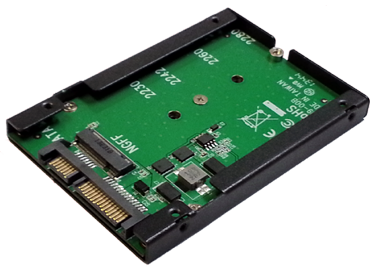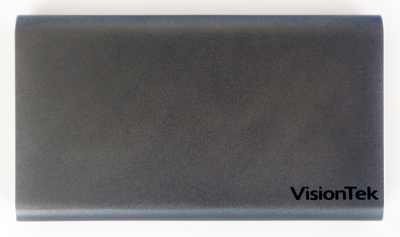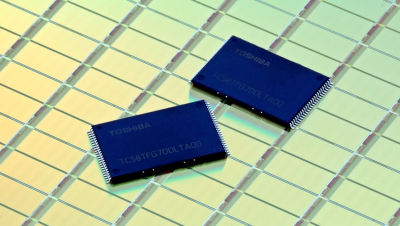- Details
- Flash Memory
Addonics Technologies today announced a family of 2.5” flash drive kits that allow users to easily replace 2.5-inch or 3.5-inch hard drives in notebook PCs or other systems with the three most popular types of flash cards.

New models include the 2.5" M2 (NGFF) SSD Drive, which allows you to use the new M2 (NGFF)SSD cards, in the form factor of 30, 42, 60 or 80 mm length, as a direct replacement for a 2.5" SATA hard drive; the 2.5" mSATA Flash drive, which uses the popular mSATA SSD to replace SATA hard drives, and the 2.5" IDE mSATA Flash drive, which replaces a 2.5" IDE hard drive with a low power and shock resistant mSATA SSD. The two SATA models are made with components that support operations in industrial temperature range. By using industrial type flash cards, these two SATA models can be deployed in harsh industrial operating environments.
- Details
- Flash Memory
VisionTek Products LLC, (VisionTek), a leading manufacturer of award-winning, high-performance upgrades and accessories for PC and Apple Macintosh computers, today announced the immediately availability of the VisionTek mSATA mini Enclosure. The USB 3.0 bus-powered enclosure is a Plug and Play solution for re-tasking an existing mSATA Solid State Drive after upgrading the SSD in an ultra-slim notebook or for adding a new mSATA SSD to create a high-performance ultra-portable external drive.

Sized smaller than a business card and weighing 0.30 ounces empty, the mSATA mini Enclosure features the SuperSpeed USB 3.0/2.0 interface to offer data rates up to 600MB/s and a bus-powered design so an AC adapter is not required. To complement its performance and portability attributes, the mSATA mini's sleek, scratch-resistant aluminum housing provides rugged durability to safeguard a drive's data and comes complete with everything needed to start using and sharing HD movies, music, photos, and important documents wherever desired.
- Details
- Flash Memory
 SanDisk Corporation, a global leader in flash storage solutions, today announced the availability of its 1Z-nanometer (nm) technology, the most advanced NAND flash process node in the world. The 15nm technology will ramp on both two bits-per-cell (X2) and three bits-per-cell (X3) NAND flash memory architectures with production ramp to begin in the second half of 2014.
SanDisk Corporation, a global leader in flash storage solutions, today announced the availability of its 1Z-nanometer (nm) technology, the most advanced NAND flash process node in the world. The 15nm technology will ramp on both two bits-per-cell (X2) and three bits-per-cell (X3) NAND flash memory architectures with production ramp to begin in the second half of 2014.
“We are thrilled to continue our technology leadership with the industry’s most advanced flash memory process node, enabling us to deliver the world’s smallest and most cost effective 128 gigabit chips,” said Dr. Siva Sivaram, senior vice president, memory technology, SanDisk. “We are delighted that these new chips will allow us to further differentiate and expand our portfolio of NAND flash solutions.”
The 15nm technology uses many advanced process innovations and cell-design solutions to scale the chips along both axes. SanDisk's All-Bit-Line (ABL) architecture, which contains proprietary programming algorithms and multi-level data storage management schemes, has been implemented in the 1Z technology to deliver NAND flash solutions with no sacrifice in memory performance or reliability. SanDisk’s 1Z technology will be utilized across its broad range of solutions, from removable cards to enterprise SSDs.
Add a comment- Details
- Flash Memory
 Toshiba’s Digital Products Division (DPD), a division of Toshiba America Information Systems, Inc., today introduced the Canvio AeroMobile Wireless SSD, a product that offers a smart, easy and more reliable way to store, stream, and share files and media from mobile devices without ever attaching a single cable.
Toshiba’s Digital Products Division (DPD), a division of Toshiba America Information Systems, Inc., today introduced the Canvio AeroMobile Wireless SSD, a product that offers a smart, easy and more reliable way to store, stream, and share files and media from mobile devices without ever attaching a single cable.
Toshiba’s new portable Canvio AeroMobile Wireless SSD is sleek and durable, combining the convenience and capacity of portable wireless storage with the proven durability and performance of solid state hard drive technology. This slim, lightweight unit allows users to upload media instantly, freeing their smartphones, tablets and cameras to take thousands of pictures and video. Up to eight devices including smartphones, laptops, tablets and PCs can access the Canvio AeroMobile Wireless SSD.
“Toshiba strives to ensure that all of our storage products are simple to use and powerful in this ever changing technological environment,” said Maciek Brzeski, vice president of product marketing and development, Branded Storage Products, Toshiba Digital Products Division. “The Canvio AeroMobile Wireless SSD makes the process of uploading and accessing content easier than ever.”
- Details
- Flash Memory
Toshiba Corporation today announced that it has developed the world’s first 15-nanometer (nm) process technology, which will apply to 2-bit-per-cell 128-gigabit (16 gigabytes) NAND flash memories. Mass production with the new technology will start at the end of April at Fab 5 Yokkaichi Operations, Toshiba’s NAND flash fabrication facility (fab), replacing second generation 19 nm process technology, Toshiba’s previous flagship process. The second stage of Fab 5 is currently under construction, and the new technology will also be deployed there.

Toshiba has achieved the world’s smallest class chip size with the 15nm process plus improved peripheral circuitry technology. The new chips achieve the same write speed as chips formed with second generation 19 nm process technology, but boost the data transfer rate to 533 megabits a second, 1.3 times faster, by employing a high speed interface.

